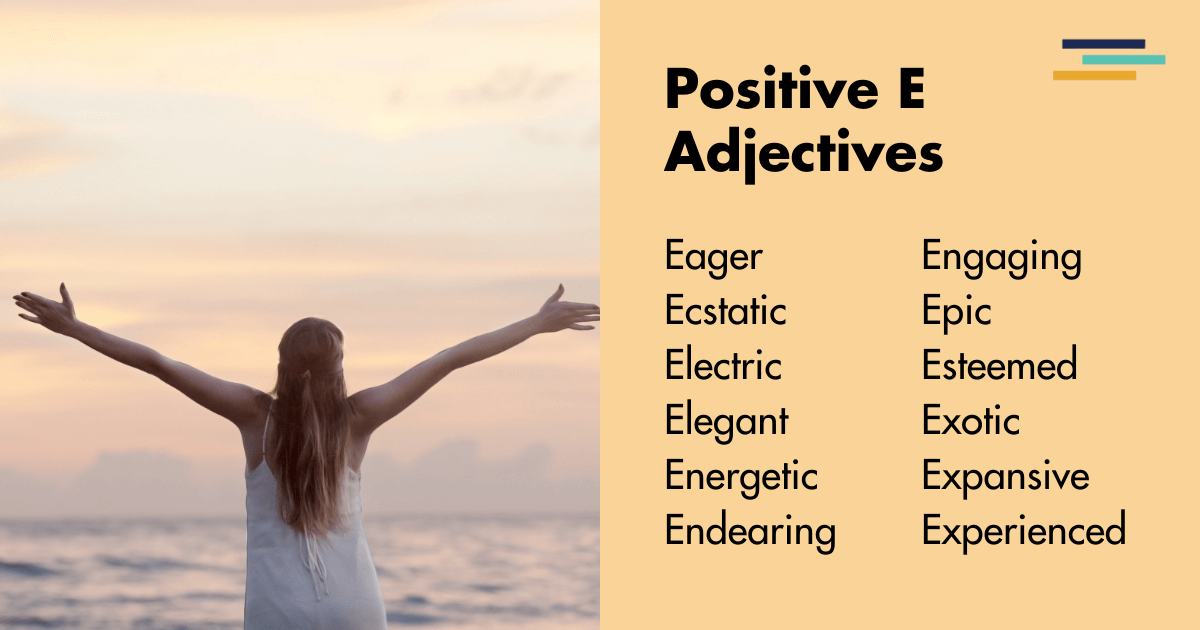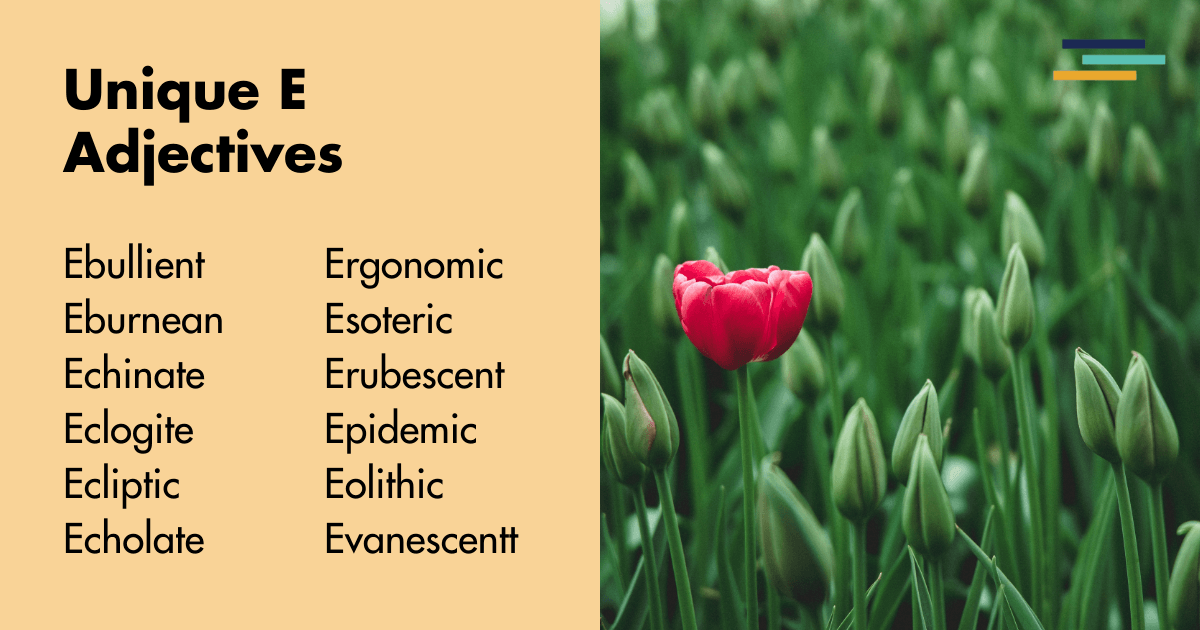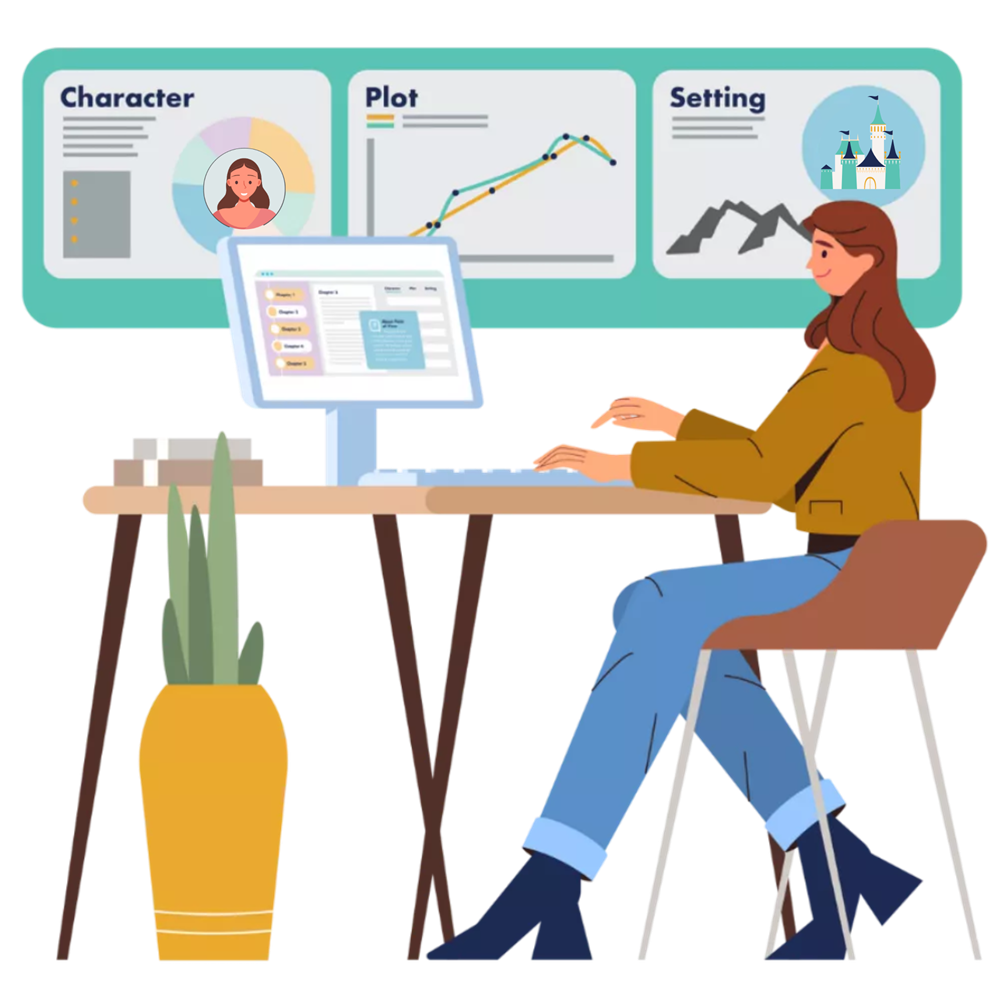
When you’re trying to describe something, choosing the perfect adjective can be tough. I don’t know about you, but I’ve stared at that blinking cursor for more time than I should while I try to decide on the best descriptor to use.
We all choose different adjectives for different reasons, including how they sound, how long they are, and whether they fit with our author’s voice.
It’s almost like you need a handy list of adjectives to choose from.
Well…
Fear not. I’ve got you covered, and this article is for you.
Below is a list of 160 adjectives that start with the letter E. Not only that, but I’ve broken them down into easily digestible categories ranging from positive and negative adjectives to professional and unique adjectives, and I’ve included my top 5 tips for using adjectives beginning with E.
You can scan the list and choose the adjective you need or read them all and store them for later.
After all, you never know when an adjective will come in handy.
Take a free trial of Fictionary today and take your story to the next level.
Positive E Adjectives
Let’s start with all the good feels and a list of positive adjectives starting with E you can use to describe all the lovely things about your characters:
- Eager: Enthusiastic and keen
- Earnest: Sincere and serious
- Easygoing: Relaxed and casual
- Eclectic: Diverse and varied
- Ecstatic: Joyful and excited
- Educated: Knowledgeable and informed
- Effective: Successful and productive
- Effervescent: Lively and bubbly
- Efficient: Productive and organized
- Elated: Joyful and overjoyed
- Electric: Exciting and thrilling
- Elegant: Graceful and stylish
- Elevated: Raised and improved
- Eloquent: Fluent and persuasive
- Emboldened: Confident and encouraged
- Empathetic: Understanding and compassionate
- Empowered: Authorized and enabled
- Enchanting: Delightful and charming
- Encouraging: Supportive and reassuring
- Endearing: Lovable and appealing
- Energetic: Active and lively
- Engaging: Captivating and enchanting
- Enlightened: Informed and aware
- Enterprising: Resourceful and ambitious
- Enthusiastic: Eager and passionate
- Epic: Grand and impressive
- Equitable: Fair and impartial
- Erudite: Learned and scholarly
- Essential: Vital and necessary
- Esteemed: Respected and admired
- Ethical: Moral and principled
- Euphoric: Blissful and ecstatic
- Evenhanded: Fair and impartial
- Eventful: Exciting and significant
- Everlasting: Eternal and timeless
- Evident: Clear and obvious
- Exalted: Elevated and praised
- Excellent: Outstanding and superior
- Exceptional: Extraordinary and remarkable
- Exciting: Thrilling and exhilarating
- Exemplary: Ideal and commendable
- Exhilarating: Invigorating and thrilling
- Exotic: Unusual and striking
- Expansive: Wide-ranging and extensive
- Experienced: Seasoned and adept
- Expert: Proficient and masterful
- Exquisite: Beautiful and delicate
- Extraordinary: Exceptional and phenomenal
- Exuberant: Lively and energetic
- Exultant: Joyful and triumphant
You can use these positive adjectives that start with E to describe various positive attributes of characters, making them more vivid and engaging for your readers.

Negative Adjectives Starting with E
Here’s a list of negative adjectives starting with E that you can use to describe challenging aspects of your characters:
- Eccentric: Unconventional and odd
- Eerie: Creepy and unsettling
- Egocentric: Self-centered and arrogant
- Elusive: Hard to pin down and evasive
- Embarrassing: Shameful and awkward
- Embattled: Besieged and troubled
- Embittered: Resentful and angry
- Empty: Vacant and void
- Enraged: Furious and angry
- Entitled: Privileged and expectant
- Envious: Jealous and resentful
- Erratic: Unpredictable and inconsistent
- Erroneous: Incorrect and wrong
- Exasperated: Annoyed and frustrated
- Excessive: Overabundant and extreme
- Excruciating: Painful and intense
- Exhausted: Tired and worn
- Expendable: Replaceable and unimportant
- Exploitative: Unfair and manipulative
- Evasive: Avoidant and indirect
These adjectives can add depth to your characters by highlighting their flaws and challenges, making them more dynamic and relatable.
Neutral Adjectives with E
Here’s a list of neutral adjectives starting with E that you can use to describe various aspects of your characters in a non-biased way:
- Elderly: Aged and senior
- Elementary: Basic and fundamental
- Equal: Even and balanced
- Equipped: Prepared and supplied
- Established: Recognized and settled
- Evolving: Changing and developing
- Exact: Precise and accurate
- External: Outer and outside
- Existent: Present and existing
- Expansive: Wide and broad
These adjectives provide clear and neutral descriptions you can apply in various contexts to describe characters without imparting a strong positive or negative bias.
Unique Descriptive Words That Start with E
Here’s a list of unique adjectives starting with E that you can use to describe various aspects of your novel:
- Ebullient: Lively and enthusiastic
- Eburnean: Ivory and white
- Ecclesiastical: Religious and clerical
- Echinate: Spiny and prickly
- Edacious: Voracious and greedy
- Eclogite: Rock-like and dense
- Ecliptic: Orbital and celestial
- Echolate: Silent and soundless
- Ectomorphic: Slim and linear
- Efferent: Outward and transporting
- Effervescent: Bubbly and fizzy
- Effete: Worn-out and exhausted
- Effulgent: Radiant and shining
- Egregious: Outrageous and notorious
- Elocutionary: Oratorical and rhetorical
- Emaciated: Thin and gaunt
- Emollient: Soothing and softening
- Endemic: Native and localized
- Enervated: Weakened and exhausted
- Encyclic: Circular and recurring
- Ensorcelled: Bewitched and enchanted
- Ephemeral: Transient and fleeting
- Epigeal: Aboveground and surface
- Epistolary: Letter-based and written
- Equanimous: Calm and composed
- Ergonomic: Functional and efficient
- Erythroid: Red and blood-related
- Esoteric: Obscure and mysterious
- Ergophobic: Work-fearing and work-phobic
- Erubescent: Blushing and reddening
- Epidemic: Disease-related and statistical
- Epidermic: Skin-related and superficial
- Eidetic: Vivid and detailed
- Eolithic: Ancient and prehistoric
- Evanescent: Vanishing and fleeting
- Exanimate: Lifeless and inert
- Exiguous: Scanty and meager
- Exophthalmic: Protruding and bulging
- Exoteric: Common and external
- Exothermic: Heat-releasing and warm
- Exultant: Joyful and triumphant
- Exemplary: Ideal and commendable
- Extrinsic: External and outward
- Eugonic: Growth-promoting and healthy
- Euphoric: Joyful and ecstatic
- Euphonious: Melodious and pleasant
- Eurythmic: Harmonious and rhythmic
- Eurythermal: Temperature-tolerant and adaptable
These unique adjectives provide distinctive descriptions that can add depth and richness to your characters, making them stand out in your narrative.
Pro Tip: Use these words sparingly. While it’s fun to throw in the odd unfamiliar adjective here and there, readers will quickly tire of your book if they have to keep reaching for a dictionary.

Adjectives That Start with E to Describe Character Traits
Here’s a list of adjectives starting with E that you can use to describe various traits your characters have:
- Earnest: Serious and sincere
- Eccentric: Unconventional and quirky
- Eclectic: Diverse and varied
- Economical: Thrifty and efficient
- Edgy: Nervous and tense
- Egalitarian: Equal and fair-minded
- Electric: Exciting and dynamic
- Elusive: Mysterious and hard-to-catch
- Emotional: Expressive and sensitive
- Energetic: Active and lively
- Enigmatic: Puzzling and mysterious
- Enthusiastic: Eager and passionate
- Epicurean: Sensual and luxurious
- Erratic: Unpredictable and inconsistent
- Exasperated: Annoyed and frustrated
- Exigent: Demanding and urgent
- Expansive: Open and communicative
- Experimental: Innovative and exploratory
- Expressive: Articulate and emotional
- Extroverted: Outgoing and sociable
These adjectives provide a varied selection for describing character traits, enhancing the depth and dimension of your characters.
Professional Adjectives That Begin with E
Here’s a list of professional adjectives starting with E that you can use to describe the professional behaviors of your characters:
- Effective: Successful and productive
- Efficient: Productive and organized
- Eloquent: Fluent and persuasive
- Enterprising: Resourceful and ambitious
- Entrepreneurial: Innovative and proactive
- Ethical: Moral and principled
- Exacting: Precise and meticulous
- Exemplary: Ideal and commendable
- Experienced: Seasoned and adept
- Expert: Proficient and masterful
These professional adjectives will help you describe the professional behaviors and traits of your characters, adding depth and specificity to their roles in your narrative.
Tips for Using Adjectives Beginning with E
Phew!
That was a long list of adjectives, but now you’re armed with an entire arsenal of powerful adjectives, starting with the letter E you can use to supercharge your writing.
Let’s look at some tips for how you can weave these descriptive words into your narrative to make your pose really sparkle.
Tip 1: Be Specific
They say a picture paints a thousand words, but one word can paint a vivid picture in your reader’s mind and completely change the tone of a sentence. The key here is to avoid bland adjectives that make readers roll their eyes in disdain.
So, instead of saying a room in your cozy mystery manor house is “posh,” which could mean a dozen different things, you could try describing it as “elegant” or “exquisite.” Not only do these words feel opulent when you read them, they create a much clearer image of the setting you’re trying to convey. When I read the word elegant, I picture a room with a sophisticated style and tasteful decor.
Of course, you’ll want to add some specific setting details so readers don’t suffer from White Room Syndrome, but using the right adjective can be a good place to start.
Tip 2: Use Adjectives in Similes and Metaphors to Enrich Your Descriptions
When people say they want their writing to be rich, chances are they’re referring to similes and metaphors, and using adjectives in this way can add real depth and imagery to your writing, allowing you to create rich prose readers remember.
Using adjectives in this way is a fantastic tool for painting a clearer picture of your characters. When describing someone’s voice, you could use a simile and say, “Her voice was as effervescent as sparkling water,” or, “His happiness was as elusive as a wisp of smoke.”
The words “effervescent” and “elusive,” when used in this context, make the image stronger.
Tip 3: Use Strong Adjectives to Give Your Writing Impact
If you’re looking for words that lend your writing intensity, then look no further than a well-used adjective. In the same way, if you’re after a softer tone in a scene, you can use adjectives that create a feeling of warmth.
Certain adjectives add power to your prose. Words like “exhilarating,”, “exceptional,” and “exuberant” convey strength. If you want to tone down the intensity in scenes where you’re letting the reader catch their breath before launching back into the action, you could try words like “easy-going” and “endearing,” which have a softer, warmer sound.
Tip 4: Use Adjectives to Create Atmosphere
Horror writers the world over know certain sounds create an atmosphere.
If your protagonist is walking home alone, late at night, and hears a twig snap behind them, this might immediately make them think they’re being followed and add a tense atmosphere to the scene.
Adjectives can have the same effect.
Words that sound softer, like “ethereal” and “enchanting,” create a more peaceful atmosphere. And harsher words laden with hard consonants, like “excruciating” or “explosive,” add intensity, and signal you’re upping the stakes in certain genres.
When you’re writing, pay attention to the words you use and the feelings they evoke in the reader.
Tip 5: Keep it Simple (and Use Complexity Sparingly)
I mentioned this earlier, but we’ve all read those novels, haven’t we? The ones where you’re Googling the meanings of words every other sentence. For many readers, especially those looking for an easy escapist read after a long day at work, this is draining.
If you want to use an unusual word in your prose, then make sure you’re doing it for the right reason (enriching your writing for the reader’s benefit) and not the wrong reason (showing off because you know a fancy word).
Adjectives can also simplify sentences.
For example, the sentence, “The experiment was enlightening,” is better than, “The experiment was very enlightening and incredibly informative,” because it conveys the same information using fewer words.
And finally, always remember the story comes first. Before worrying about the perfect adjective to use, it’s best to focus on:
- Creating engaging characters
- Penning an interesting plot
- Structuring solid settings
A tool like Fictionary helps you turn your draft into an interesting story readers love. So, with the right adjectives and a strong narrative foundation, your writing can truly shine.



